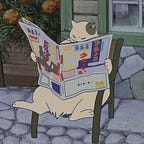One thing I learned from Joan Didion
A minor takeaway from my favourite essay
Joan Didion has been a lot of things for me, a mentor, an inspiration, a fashion icon, a friend, a kind stranger lending me their words.
At times, I have envied her for her ability to choose her words so carefully, with such glaring intent that it hits you right across the face like a mean upper-cut. I have also been in awe of her, looked up to her, tried to be like her, but more importantly, tried to learn from her.
There are days I would scribble her name–Joan Didion–all over the pages of my journal as if her name alone could magically transform me as a writer, as a person, as a keeper of secrets in my hair. All it gives me is an overarching sense of connection. As if all women writers to ever exist somehow understand each other, are somehow connected through their collective joy and plight.
If I have to tell you one thing that sticks with me, it’d be her essay On Keeping A Notebook. Didion, in ways, has taught me the comfort of lying to myself, sinking myself in enough delusion to deem my life interesting enough for documentation. She says, “How it felt to me: that is getting closer to the truth about a notebook,” and as I read it, I am driven to write in my notebooks more.
Not writing silly entries about the kind of bread I’ve had for breakfast but don’t remember the taste of; instead, being more deliberate, more callous, a bit deviant with the things I wrote in my diaries. Above all, I learned the power of making up things, having the courage to trick people into looking at things the way you want them to, failing their visceral memories and replacing them with your own.
Why did I write it down? In order to remember, of course, but exactly what was it I wanted to remember? How much of it actually happened? Did any of it? Why do I keep a notebook at all? It is easy to deceive oneself on all those scores. The impulse to write things down is a peculiarly compulsive one, inexplicable to those who do not share it, useful only accidentally, only secondarily, in the way that any compulsion tries to justify itself. I suppose that it begins or does not begin in the cradle. Although I have felt compelled to write things down since I was five years old, I doubt that my daughter ever will, for she is a singularly blessed and accepting child, delighted with life exactly as life presents itself to her, unafraid to go to sleep and unafraid to wake up. Keepers of private notebooks are a different breed altogether, lonely and resistant rearrangers of things, anxious malcontents, children afflicted apparently at birth with some presentiment of loss.
Above is a passage from the complete essay, one that constantly stays with me and jumps at me whenever I think of my motivations, my reason to live the precarious life of trying to be a writer. Didion, as always, helps.
